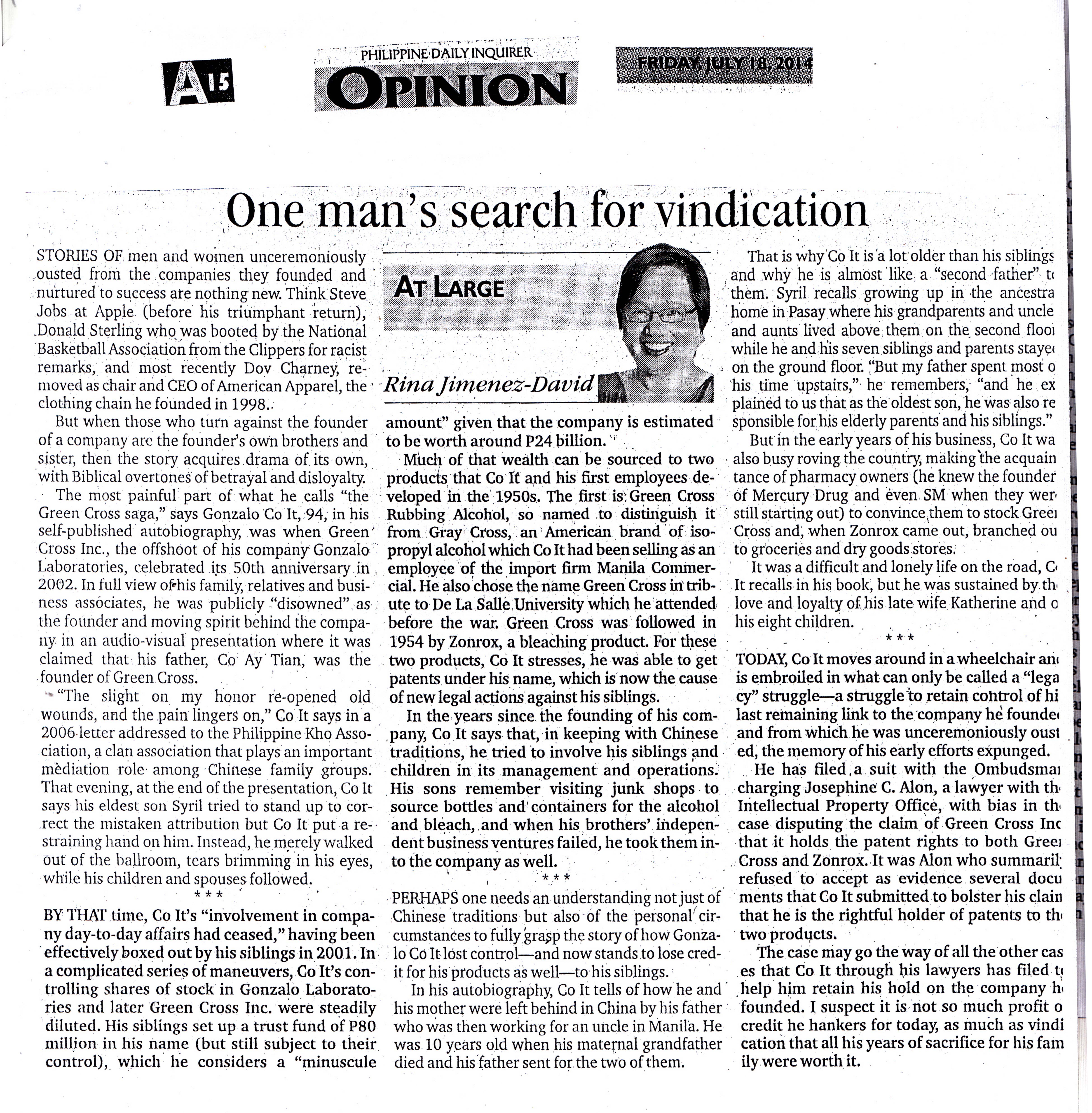STORIES men and women unceremoniously ousted from the companies they founded and nurtured to success are nothing new. Think Steve Jobs at Apple (before his triumphant return), Donald Sterling who was booted by the National Basketball Association from the Clippers for racist remarks, and most recently Dov Charney, removed as chair and CEO of American Apparel, the clothing chain he founded in 1998.
But when those who turn against the founder of a company are the founder’s own brothers and sister, then the story acquires drama of its own, with Biblical overtones of betrayal and disloyalty.
The most painful part of what he calls “the Green Cross saga,” says Gonzalo Co It, 94, in his self-published autobiography, was when Green Cross Inc., the offshoot of his company Gonzalo Laboratories, celebrated its 50th anniversary in 2002. In full view of his family, relatives and business associates, he was publicly “disowned” as the founder and moving spirit behind the company in an audio-visual presentation where it was claimed that his father, Co Ay Tian, was the founder of Green Cross.
“The slight on my honor re-opened old wounds, and the pain lingers on,” Co It says in a 2006 letter addressed to the Philippine Kho Association, a clan association that plays an important mediation role among Chinese family groups. That evening, at the end of the presentation, Co It says his eldest son Syril tried to stand up to correct the mistaken attribution but Co It put a restraining hand on him. Instead, he merely walked out of the ballroom, tears brimming in his eyes, while his children and spouses followed.
* * *
BY THAT time, Co It’s “involvement in company day-to-day affairs had ceased,” having been effectively boxed out by his siblings in 2001. In a complicated series of maneuvers, Co It’s controlling shares of stock in Gonzalo Laboratories and later Green Cross Inc. were steadily diluted. His siblings set up a trust fund of P80 million in his name (but still subject to their control), which he considers a “minuscule amount” given that the company is estimated to be worth around P24 billion.
Much of that wealth can be sourced to two products that Co It and his first employees developed in the 1950s. The first is Green Cross Rubbing Alcohol, so named to distinguish it from Gray Cross, an American brand of isopropyl alcohol which Co It had been selling as an employee of the import firm Manila Commercial. He also chose the name Green Cross in tribute to De La Salle University which he attended before the war. Green Cross was followed in 1954 by Zonrox, a bleaching product. For these two products, Co It stresses, he was able to get patents under his name, which is now the cause of new legal actions against his siblings.
In the years since the founding of his company, Co It says that, in keeping with Chinese traditions, he tried to involve his siblings and children in its management and operations. His sons remember visiting junk shops to source bottles and containers for the alcohol and bleach, and when his brothers’ independent business ventures failed, he took them into the company as well.
* * *
PERHAPS one needs an understanding not just of Chinese traditions but also of the personal circumstances to fully grasp the story of how Gonzalo Co It lost control—and now stands to lose credit for his products as well—to his siblings.
In his autobiography, Co It tells of how he and his mother were left behind in China by his father who was then working for an uncle in Manila. He was 10 years old when his maternal grandfather died and his father sent for the two of them.
That is why Co It is a lot older than his siblings, and why he is almost like a “second father” to them. Syril recalls growing up in the ancestral home in Pasay where his grandparents and uncles and aunts lived above them on the second floor, while he and his seven siblings and parents stayed on the ground floor. “But my father spent most of his time upstairs,” he remembers, “and he explained to us that as the oldest son, he was also responsible for his elderly parents and his siblings.”
But in the early years of his business, Co It was also busy roving the country, making the acquaintance of pharmacy owners (he knew the founders of Mercury Drug and even SM when they were still starting out) to convince them to stock Green Cross and, when Zonrox came out, branched out to groceries and dry goods stores.
It was a difficult and lonely life on the road, Co It recalls in his book, but he was sustained by the love and loyalty of his late wife Katherine and of his eight children.
* * *
TODAY, Co It moves around in a wheelchair and is embroiled in what can only be called a “legacy” struggle—a struggle to retain control of his last remaining link to the company he founded and from which he was unceremoniously ousted, the memory of his early efforts expunged.
He has filed a suit with the Ombudsman charging Josephine C. Alon, a lawyer with the Intellectual Property Office, with bias in the case disputing the claim of Green Cross Inc. that it holds the patent rights to both Green Cross and Zonrox. It was Alon who summarily refused to accept as evidence several documents that Co It submitted to bolster his claim that he is the rightful holder of patents to the two products.
The case may go the way of all the other cases that Co It through his lawyers has filed to help him retain his hold on the company he founded. I suspect it is not so much profit or credit he hankers for today, as much as vindication that all his years of sacrifice for his family were worth it.


